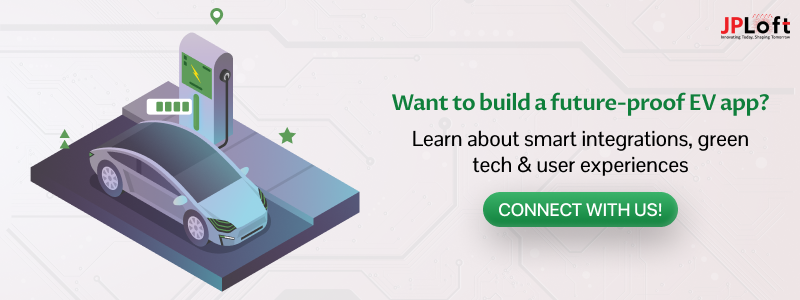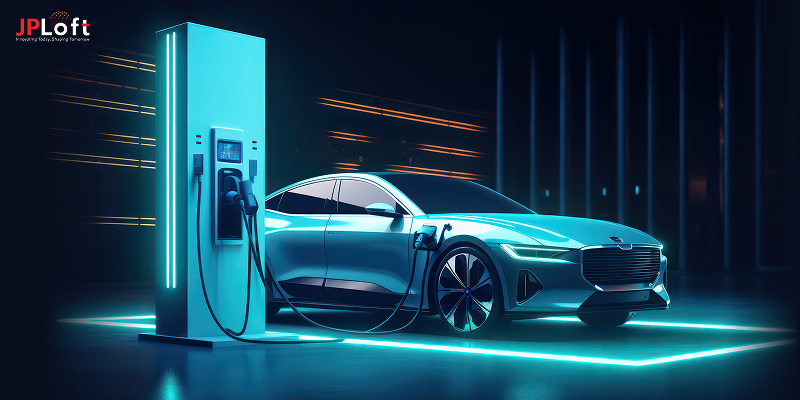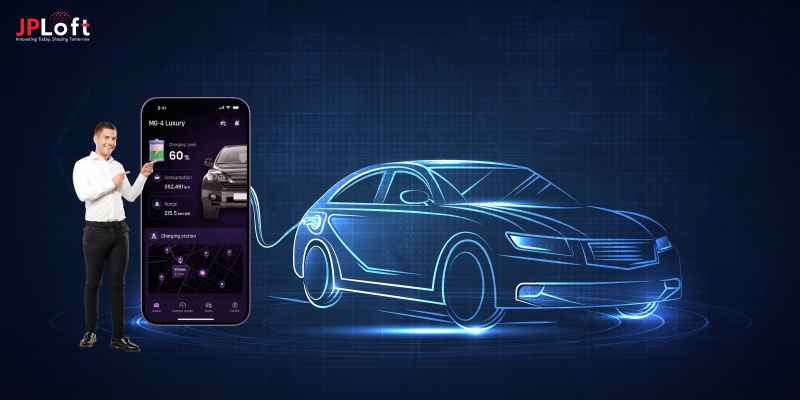“The future is electric.”– Elon Musk
EV app development trends are revolutionizing the electric mobility landscape, because the EV revolution today isn’t just about vehicles anymore, it's about building smart, connected ecosystems.
From tracking battery health to locating nearby charging stations and managing entire EV fleets, these apps are reshaping how consumers and businesses interact with electric vehicles.
And the demand is only growing, the global electric vehicle market is expected to reach $957 billion by 2030, and the connected car market is projected to hit $166 billion by 2025. EV apps are playing a crucial role in enabling that growth.
In this blog, we’ll dive into the top EV app development trends that are shaping the future of e-mobility, helping startups, enterprises, and developers build smarter, greener, and more user-friendly solutions.
What is the EV App?
An EV app is a mobile or web-based application designed to support and enhance the electric vehicle (EV) experience. These apps help users with real-time navigation to charging stations, monitor battery status, schedule charging sessions, and even manage entire EV fleets.
Whether you're an individual EV owner or a business with electric vehicles, an EV app ensures smooth and smart vehicle operation. Modern EV apps are built using the latest technology trends such as AI-powered route optimization, IoT integration for vehicle diagnostics, and cloud-based analytics.
These innovations not only improve convenience but also contribute to energy efficiency and sustainability. As the demand for electric vehicles grows, EV apps are becoming a critical touchpoint in the e-mobility ecosystem, bridging the gap between users, vehicles, and infrastructure.
Market Statistics of Electric Vehicle App
According to industry reports, the global electric vehicle software development market which includes apps for charging, navigation, fleet tracking, and vehicle diagnostics is witnessing an unprecedented boom and EV apps are right at the center of this digital transformation. Let’s discuss it in detail.
-
According to Introspective Market Research, the electric vehicle software market was valued at $312.37 billion in 2024 and is projected to reach $1,119.58 billion by 2032, registering a CAGR of 17.30% between 2025 and 2032.
-
As reported by Statista, the global electric vehicles market is expected to generate a remarkable $784.2 billion in revenue by 2025.
-
More than 60% of EV users interact with their vehicles through mobile apps, making EV apps a significant business opportunity.
-
Study by Global Market Insights shows that the global EV charging management software platform market was valued at $2.8 billion in 2024 and is projected to grow at a CAGR of 23.1% between 2025 and 2034.
-
A rising trend is the use of subscription-based EV services via mobile apps, offering features like premium navigation and remote diagnostics. It’s boosting engagement and creating new revenue streams for EV software providers.Clearly, the demand for advanced EV apps is accelerating faster than ever. Businesses that act now and align with evolving market needs will be well-positioned to lead the e-mobility revolution.
The future of mobility is digital and it starts with innovative app solutions.
Emerging & Next-Gen EV App Trends You Shouldn’t Miss
As the world shifts toward clean mobility, EV app development trends are playing a transformative role in building smarter, sustainable, and user-first platforms.
Businesses are no longer just trying to create functional apps, they’re aiming to build intelligent systems that offer real-time connectivity, predictive features, and seamless user experiences.
Below, we explore the most significant trends in EV app development that you must watch out for if you want to stay competitive in 2026 and beyond:
1. AI & Predictive Analytics – Smart, Data-Driven Decisions
The emerging trend for EV apps is the integration of Artificial Intelligence and predictive analytics to drive personalization and performance.
With AI in electric vehicles, apps can recommend optimal charging schedules, detect issues before they happen, and even suggest nearby services based on vehicle behavior.
If you're planning to create an AI app in this domain, ensure it adapts to real-world driving data for smarter outcomes. This not only improves the user experience but also reduces vehicle downtime and increases battery efficiency.
2. IoT Integration – Real-Time Monitoring & Automation
With the Internet of Things, EV apps can communicate with vehicles, charging hardware, and external infrastructure in real time. This technological trend enables users to remotely lock or unlock their car, check charging progress, and receive instant fault alerts, all through their smartphones.
To bring these smart features to life, integrating IoT development services during the app prototyping phase is crucial. It helps developers map out the right functionality early on, ensuring seamless connectivity and user convenience.
3. Charging Station Integration – One-Tap Navigation & Booking
Locating and reserving charging stations is one of the most valued features in an EV app. This EV app market trend enhances driver convenience while reducing range anxiety. With live availability, estimated charging time, and payment options, users can plan their journeys more confidently.
As this becomes a standard feature, businesses must hire dedicated developers capable of working with multiple station APIs and mapping tools like Google Maps or Open Charge Map.
4. Voice & Wearable Integration – The Rise of Next-Gen UX
With wearable devices becoming more common, next-generation EV app trends are now focused on seamless interactions.
Imagine checking your car's battery life from your smartwatch or starting the air conditioner through voice command before entering the vehicle.
These UX improvements align with modern design trends in EV app interfaces, minimalist, accessible, and fast. During early stages, thorough app wireframing helps visualize how users will interact with such features across devices.
5. Fleet Management Solutions – Scalability for Businesses
Large-scale fleet operators, delivery companies, and ride-sharing services are looking for enterprise-level EV solutions or planning to build an EV fleet management app.
This has given rise to EV app trends for businesses, including dashboards for multiple vehicle tracking, driver performance, route optimization, and charging analytics.
If you're in this space, you must hire a mobile app developer who understands the complexity of fleet ecosystems and can integrate data visualization tools, reports, and notifications that help managers make timely decisions.
6. Cybersecurity – A Priority, Not an Option
As EV apps process sensitive data like payment information, GPS tracking, and vehicle controls, adopting the best security practices for EV apps has becomes non-negotiable.
The current trends in EV app security focus on biometric authentication, encrypted communication, and anomaly detection.
Your development partner must include security testing from day one. Consider working with a best mobile app development company that offers end-to-end security measures with ongoing app maintenance.
7. Advanced UI/UX – Minimalist Yet Powerful Interfaces
Modern EV app users want experiences that are intuitive and aesthetically pleasing. From real-time charging animations to customizable dashboard skins, design trends in EV apps are embracing user personalization.
Features like dark mode, gesture-based navigation, and simplified onboarding are now becoming standard. That’s why investing in app wireframing and app prototyping during early development can ensure your EV app doesn’t just work well but feels great to use.
8. Modular Development – For Scalability & Speed
Using modular architecture and microservices allows developers to isolate specific features, making it easier to update or scale individual components.
This trend in EV app development is perfect for startups aiming to scale over time.
You don’t have to rebuild your app each time you want to roll out a new service. Instead, just extend your existing modules. When you create an app, think of long-term flexibility and reduced maintenance costs.
9. Sustainable Tech – Green Is the New Smart
As sustainability becomes central to business strategies, apps are also adopting eco-conscious practices.
The latest technology trends in EV apps include carbon tracking, eco-mode suggestions, and reminders to use renewable energy sources.
Collaborating with a mobile app development company in Denver or similar sustainability-focused regions gives you access to talent that prioritizes green development, carbon-efficient algorithms, and renewable-friendly features.
10. Business Intelligence Dashboards – Real-Time Insights
Whether you are managing a single EV or hundreds, real-time insights drive smarter decisions.
This electric vehicle app trend is especially valuable for businesses that need to analyze usage patterns, energy costs, driver performance, and app engagement metrics.
Adding BI dashboards requires solid backend architecture. You may need to hire iOS app developers or a cross-platform expert to build a data-driven platform that doesn't compromise performance.
Understanding the key trends in EV app development helps you build with foresight not just functionality. By incorporating these top EV app development trends, businesses can cater to modern user expectations while being prepared for what's next.
Whether you're looking to build from scratch or revamp your existing app, it’s crucial to choose the right tech stack, team, and vision.
Why AI, ML, and NLP Are Key EV App Development Trends in 2026?
In 2026, one of the most defining EV app development trends is the integration of Artificial Intelligence (AI), Machine Learning (ML), and Natural Language Processing (NLP). These technologies are no longer optional add-ons, they're becoming essential components in building intelligent, responsive, and user-centric EV apps.
With the help of a reliable AI development service, EV apps can now deliver real-time recommendations for charging stations, detect battery issues before they occur, and personalize the driving experience based on user behavior. This predictive intelligence is driving user satisfaction and operational efficiency like never before.
On the other hand, an advanced ML development service can help apps learn from user data to optimize routes, monitor energy consumption patterns, and even suggest the best time to charge based on dynamic grid rates or weather forecasts. Machine learning is enabling EV apps to continuously evolve and improve without manual updates.
Meanwhile, voice assistants powered by NLP development services are enhancing accessibility. Users can now interact with their EVs using natural language, checking battery status, locating nearby chargers, or setting up service appointments all via voice commands. This smooth interaction boosts engagement and convenience, especially while driving.
Together, AI, ML, and NLP are transforming static EV apps into intelligent mobility platforms. As competition rises in the e-mobility space, integrating these smart capabilities can give your app the edge it needs.
If you're planning to build or scale your EV app, investing in trusted AI, ML, and NLP development services is a strategic step toward long-term success.
How Top EV Apps Are Leveraging Industry Trends?
As the electric vehicle market expands, some EV apps and the best EV charging apps are setting themselves apart by tapping into the most impactful EV app development trends.
Let’s take a look at how 5 top apps are smartly using industry trends to drive growth and improve user experience.
► PlugShare
PlugShare is leading with real-time charging station mapping app. It is a clear example of the trends in EV app design focused on community-driven data. It’s intuitive, constantly updated, and highly reliable for planning EV trips. You can plan to build an app like PlugShare by partnering with experienced developers.
► ChargePoint
ChargeMap uses IoT integration and AI-based energy management to offer a seamless charging experience. Its mobile app even allows users to schedule charging sessions and monitor usage analytics, embracing smart technological trends of EV apps and a perfect example for the entrepreneurs planning to build an app like ChargeMap.
► EVgo
EVgo focuses heavily on sustainability features and offers users visibility into renewable energy usage at charging stations. It's leveraging the latest technology trends to align with eco-conscious users, clearly riding the wave of green app development.
► Zap-Map
Popular in the UK, Zap-Map uses advanced route optimization, live availability, and payment integration matching well with current trends in EV app functionality. It’s an example of how smart design and real-time updates attract loyal users.
► EV Connect
EV Connect is using cloud infrastructure and fleet management tools, focusing on EV app trends for businesses. Their scalable backend and analytics dashboard show a strong understanding of the trend in EV app development geared toward enterprise needs.
These brands prove that success lies in understanding and applying the right EV app development trends at the right time.
Tips to Future-Proof Your EV App
As the EV landscape continues to evolve rapidly, simply launching an app isn’t enough. You need to ensure that your EV app remains scalable, secure, and aligned with user expectations and industry standards for years to come.
Here are some smart tips to future-proof your EV app:
-
Embrace Modular Architecture: Design your app in a way that allows new features and technologies to be added easily without overhauling the entire system.
-
Use Scalable Cloud Infrastructure: Choose cloud platforms that can grow with your user base and handle real-time data processing efficiently.
-
Stay Updated with the Latest Technology Trends: Continuously integrate advancements like AI, machine learning, blockchain, and IoT to keep your app competitive.
-
Focus on Cross-Platform Compatibility: Ensure seamless performance across iOS, Android, and even wearable or in-car systems.
-
Prioritize Cybersecurity Measures: Invest in strong encryption, authentication protocols, and regular security audits to protect user data.
-
Integrate Real-Time Analytics: Enable data-driven decisions by tracking user behavior, app performance, and energy usage patterns.
-
Gather Continuous User Feedback: Regularly update your app based on real-world feedback to keep the user experience smooth and intuitive.
-
Comply with Regulatory Standards: Keep your app aligned with EV and data regulations in different markets to avoid legal issues.
By implementing these tips, you’ll not only extend your app’s lifespan but also position it as a market leader in the ever-growing EV ecosystem.
Why Choose JPLoft – A Trusted EV App Development Company
If you're looking to build a high-performance and future-ready EV app, JPLoft is your go-to EV software development company. With years of experience in on-demand solutions, mobility platforms, and the latest tech stacks, JPLoft specializes in creating user-centric EV apps tailored to your goals.
From seamless charging station locators to advanced fleet management systems, we integrate smart features powered by AI, IoT, and cloud computing. Our team stays updated with the latest technology trends to deliver scalable, secure, and intuitive apps that align with the evolving EV market.
Partner with JPLoft to turn your e-mobility vision into reality and stay ahead in the race toward a sustainable future.
Conclusion
The EV industry is accelerating fast, and so is the demand for smarter, tech-driven solutions. That’s why keeping up with the latest EV app development trends is more important than ever. Whether you're a startup exploring opportunities or a business aiming to enhance your user experience, the right app can make all the difference.
Now that you know what’s shaping the future of e-mobility, it’s time to put your ideas into action. Let innovation lead the way, because the future is electric, and it's already here.
Start building your EV app today and be part of the change driving tomorrow.
FAQs
Get insights on AI, IoT integration, smart charging, and more shaping the EV app space.
Learn how EV apps enhance user experience, efficiency, and sustainability.
Discover how AI, cloud computing, IoT, and real-time data drive EV app innovation.
Know what to look for in terms of expertise, portfolio, tech stack, and customization.
Yes! Learn how modern EV apps cater to personal EV owners and large-scale fleet operators.












Share this blog